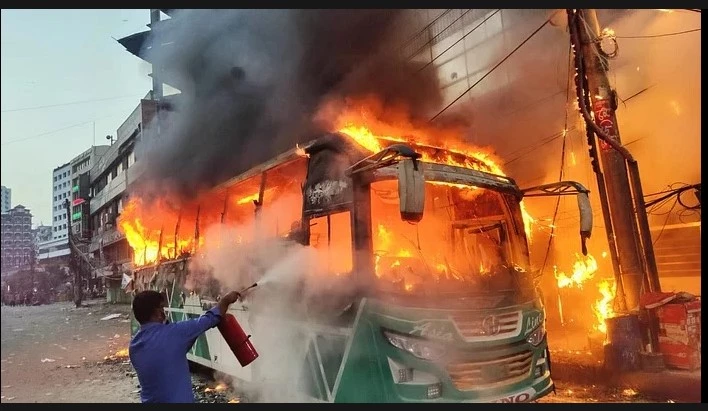Bus torched as Bangladesh set to declare new minimum wage

Stay tuned with 24 News HD Android App

Police fired tear gas at thousands of workers who set a bus on fire outside Bangladesh's capital Tuesday, with tensions rising ahead of a new minimum wage announcement for millions of garment labourers.
Bangladesh's 3,500 garment factories account for around 85 percent of the South Asian country's $55 billion in annual exports, supplying many of the world's top names in fashion including Levi's, Zara and H&M.
But conditions are dire for many of the sector's four million workers, the vast majority of whom are women whose monthly wages start at 8,300 taka ($75).
Workers have gone on strike to demand a near-tripling of their wages, with violent scenes in recent days, while employers have offered 25 percent.
The state-appointed minimum wage board panel, which includes representatives from the manufacturers, unions and wage experts, was due to announce a new pay level on Tuesday.
Police said violence broke out in the industrial city of Gazipur as some 6,000 workers walked out of their plants and staged protests following rumours that authorities would raise their wages to only around half their demand.
"They torched a bus. We fired tear gas to disperse them," Gazipur industrial police unit chief Sarwar Alam told AFP.
A police officer told AFP the workers reacted furiously to "fake news" posted on social media that union leaders had been arrested and the panel would set the minimum wage at 12,000 taka ($108) rather than the 23,000 ($208) labourers are seeking.
"The manufacturers' proposal should start from above 15,000 taka," Kalpona Akter, the head of the Bangladesh Garment and Industrial Workers Federation, told AFP.
The panel normally sits every five years and in 2018 raised the basic minimum from 5,000 taka to 8,000. Garment workers also get at least 300 taka per month as an attendance fee.
Unions say their members have been hard hit by persistent inflation, which in October reached nearly 10 percent, and a cost of living crisis partly triggered by the taka depreciating about 30 percent against the US dollar since early last year.
Police said some 600 factories that make clothing for many major Western brands were shuttered last week and scores were ransacked as the worst wage protest in a decade hit major industrial areas and a suburb of the capital.
Four factories were torched and at least two workers were killed in the violence, with tens of thousands of workers including women blocking highways and attacking factories.
The protests have coincided with separate violent demonstrations by opposition parties demanding the resignation of Prime Minister Sheikh Hasina ahead of elections due in January.
